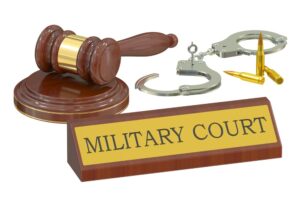Court-Martial, Separation & Criminal Investigations in the Army
If you are a soldier facing a court-martial, separation proceedings, or criminal investigation in the Army, seek the counsel of an experienced military lawyer immediately. The consequences of a conviction or adverse action can curtail your military career, benefits, freedom, and future.
A skilled military attorney can protect your rights and help you overcome these challenging circumstances.
What Is a Court Martial?
A court-martial is a military court that tries service members for violations of the Uniform Code of Military Justice (UCMJ).
There are three types of courts-martial:
Summary Court Martial

A Summary Court Martial is the lowest level of court-martial in the military. It handles minor offenses, similar to misdemeanors in the civilian court system.
Some examples of cases that might go to a Summary Court Martial include:
- AWOL (absent without leave) for a short period
- Disrespect to an officer
- Disobeying an order
- Minor fights or altercations
In a Summary Court Martial, there is no judge or jury like in a civilian trial. Instead, a single officer, usually a Lieutenant Colonel or above, serves as both judge and jury. This means they alone hear the evidence and decide whether the accused is guilty or not guilty.
The accused has the right to object to the officer selected to be the Summary Court Martial officer.
The maximum punishments in a Summary Court Martial are limited. The officer can give punishments like restriction to base, forfeiture of pay, reduction in rank for enlisted members, and confinement for up to 30 days.
A Summary Court Martial does not result in a federal criminal conviction. However, it still goes on your military record and can impact your career.
If you face a Summary Court Martial, you may consult a military lawyer before proceeding. A lawyer can advise you on your options, like turning down the Summary Court Martial and requesting a Special or General Court Martial instead, where you will have more legal rights and a better chance of fighting the charges against you.
Special Court Martial
The next level up is a Special Court Martial. This is considered an intermediate-level court-martial, used for offenses more serious than those in a Summary Court Martial but not as severe as felony-level offenses.
Some examples of charges that might be handled at a Special Court Martial include:
- Assault
- Possession or use of illegal drugs
- Larceny (theft)
- Longer periods of AWOL
A Special Court Martial is more similar to a civilian criminal trial than a Summary Court Martial is. A military judge presides over the case, and the accused has the right to a trial by a panel of at least three service members (similar to a jury). The accused is also entitled to a military lawyer to represent them, or they can hire their own civilian defense counsel.
The maximum punishment possible in a Special Court Martial is less than in a General Court Martial. The most serious punishments available are a bad conduct discharge, forfeiture of 2/3 pay for up to a year, reduction in rank, and confinement for up to one year. While a Special Court Martial conviction is technically considered a federal conviction, it is not the same as being convicted of a felony.
If facing a Special Court Martial, having an experienced military defense lawyer in your corner is key. A lawyer can challenge the evidence against you, cross-examine witnesses, and present your story to the judge and panel.
Sometimes, your lawyer may get the charges reduced to a Summary Court Martial or work out an alternate disposition without a court-martial altogether.
General Court Martial

A General Court Martial is the highest level of court-martial and reserved for the most serious offenses under the UCMJ. It is equivalent to a felony prosecution in civilian court.
Charges that may be referred to a General Court Martial include:
- Murder
- Rape or sexual assault
- Armed robbery
- Desertion
- Fraud or embezzlement
General Courts Martial have a military judge presiding, but unlike a Special Court Martial, the accused may choose whether they want a judge or a panel (jury) of at least five service members to hear their case. The rules of evidence and trial procedure are also more formal and complex compared to lower-level courts-martial.
The punishments in a General Court Martial are the most severe available under the UCMJ. A conviction can result in a dishonorable discharge, forfeiture of all pay and allowances, reduction in rank, and lengthy confinement in military prison, up to life without parole. Some offenses even carry the possibility of death.
A General Court Martial conviction is a permanent federal felony conviction that will follow you even after leaving the military.
If you are accused of a serious offense and face the possibility of a General Court Martial, your choice of defense attorney is one of the most important decisions you can make. You need a lawyer experienced in high-stakes court-martial cases who can conduct a thorough investigation, analyze the evidence, and mount an aggressive defense on your behalf.
Don’t leave your fate to an inexperienced appointed attorney – consider hiring military counsel with a proven track record of delivering favorable results in General Court Martial cases.
Administrative Separation
In some cases, instead of or in addition to a court-martial, you may face administrative separation proceedings. This means involuntarily removing a soldier from the Army before their term of service ends.
Some common reasons for administrative separation include:
- Misconduct
- Poor duty performance
- Physical or mental conditions
- Alcohol or drug abuse rehabilitation failure
There are different characterizations of administrative separation, including honorable, general, and other than honorable (OTH). Your discharge category affects your ability to access veteran’s benefits and can damage your future employment prospects.
If you face administrative separation, you may consult a military lawyer who can represent you in the proceedings and advocate for a more favorable characterization of service.
Criminal Investigations
If you are suspected of an offense under the UCMJ, you may be subject to a criminal investigation by the Army Criminal Investigation Division (CID) or Military Police.
Some common offenses that may trigger an investigation include:
- Sexual assault
- Domestic violence
- Drug use or distribution
- Theft or fraud
- Assault
If you are under investigation, you must exercise your right to remain silent under Article 31 of the UCMJ.
Do not make any statements to investigators without consulting a military defense attorney first. What you say the military can use against you in a court-martial or separation proceeding. A lawyer can communicate with investigators and protect your rights.
Potential Consequences
The consequences of a court-martial conviction, adverse separation, or substantiated criminal allegation can damage you personally and professionally.
Depending on the offense, you can face:
- Confinement in military prison
- Reduction in rank
- Forfeiture of pay and allowances
- Punitive discharge (dishonorable or bad conduct discharges)
- Criminal record
- Loss of veteran’s benefits
- Difficulty finding future employment
- Damage to personal relationships
With so much at stake, you must present the strongest defense possible with the help of a military attorney well-versed in these matters.
An attorney can work to get the charges against you dismissed, negotiate a more favorable pretrial agreement, or aggressively defend you at trial.
Your Rights
As a soldier facing legal action under the UCMJ, you have important rights, including:
- The right to remain silent (Article 31)
- The right to an attorney
- The right to a fair and impartial hearing
- The right to cross-examine witnesses
- The right to present evidence in your defense
- The right to appeal a conviction
However, to fully exercise these rights, you need an experienced advocate. The military justice system is stacked against the accused, with your commander, law enforcement, and the prosecution all working toward a conviction. Enlisting a military defense lawyer levels the playing field.
Choosing a Military Lawyer

So, how do you choose the right military defense attorney?
Here are some key considerations:
- Are they experienced with your type of case (court-martial, separation, investigation)?
- Do they have a proven track record of successful results?
- Are they exclusively focused on military law?
- Do they have experience in your branch of service?
- Are they willing to travel to your location worldwide?
- Do they have the time and resources to dedicate to your case?
- Do they offer free consultations?
You’ll want to choose an attorney who makes you feel comfortable and confident in their abilities. Don’t just go with the free military lawyer appointed to you – consider retaining military counsel with the skills and experience to get you the best possible outcome.
What to Expect from Your Lawyer
When you hire a military defense attorney, you should expect them to:
- Thoroughly investigate the allegations against you
- Identify weaknesses in the government’s case
- Gather evidence to support your defense
- Interview witnesses
- Hire expert witnesses if needed
- Advise you on your options
- Negotiate with the command and prosecutors
- Zealously represent you in court
- Keep you informed throughout the process
- Fight for the best possible result
Your lawyer should be your strongest advocate and a source of guidance during this stressful time. They can honestly assess your case and weigh the pros and cons of your legal options, whether going to trial, accepting a plea deal or separation, or pursuing an administrative resolution.
FAQs
Do you still have questions about military justice matters? Here are answers to some frequently asked questions:
Q: What’s the difference between a court-martial and non-judicial punishment/Article 15?
A: A court-martial is a formal criminal proceeding, whereas non-judicial punishment is a disciplinary measure imposed by your commander.
Article 15 doesn’t result in a criminal conviction, but it can still have significant consequences like a reduction in rank, forfeiture of pay, extra duty, and restrictions. You can refuse Article 15 and demand a court-martial instead, where you have greater legal rights.
Q: Can I request a different military lawyer if I don’t like the one appointed to me?
A: Yes – if you face a general or special court-martial, you may request a different military counsel, or individual military counsel (IMC). However, the IMC’s workload and duties may prevent it from representing you.
You can also hire a civilian military defense lawyer in addition to or instead of your appointed counsel.
Q: What if I can’t afford a civilian military lawyer?
A: Some civilian military defense firms offer payment plans or may take on pro bono cases in certain circumstances.
Don’t assume you can’t afford a civilian lawyer without considering your options. Investing in your defense is worth the cost when your career, benefits, and freedom are on the line.
Q: What should I do if I’m contacted by military law enforcement?
A: Invoke your Article 31 rights to remain silent and to an attorney. Politely tell the investigators you will not answer any questions without a lawyer present. Then, immediately contact a military defense attorney for advice before agreeing to an interview or providing any statements. What you say can and will be used against you.
Q: How long does a court-martial take?
A: The timeline for a military court-martial varies depending on the case’s complexity, the availability of witnesses, courtroom scheduling, and other factors.
Your lawyer can give you an estimate for your specific case.
Q: Can I expunge a court-martial conviction?
A: No, a court-martial conviction is a permanent federal conviction that cannot be expunged. However, you can apply for a pardon or have your records corrected by the military board for correction of records. An experienced military lawyer can advise you on these post-conviction options.
Contact a Military Defense Attorney
If you or a loved one in the Army is facing a court-martial, separation, or criminal investigation, you need an experienced military defense attorney on your side. Reach out today for a free, confidential consultation with a skilled military lawyer ready to fight for you.
Don’t let a military justice action ruin your career and future – call now to start defending your rights, reputation, and freedom.
